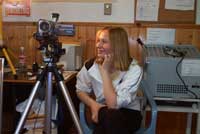
Burnt Islands Community Media Workshops
In 2003 the Burnt Islands Sharing Our Future Community Media Youth project entered its second phase.
The new community media facilitators were Jeanette Riles and Linda Vautier.
Initial discussions with the project partners demonstrated a need to address the sustainability of this project. It was decided to focus on making sure a youth from the community is reponsible for learning/teaching each workshop component. Sustainability was also addressed through more emphasis on earning income through media activities. This will be tied in to internet components.
Burnt Islands SOF 2003 also addressed the need for a promotional community video; the goal of attaining a community radio station, and the relationship of community media and educational institutions.
Don Murphy, College of the North Atlantic, and Ivan Emke, Sir Wilfred Grenfell College, played key roles in the second phase of the project.
2003 - 2004 Report:
The second phase of the Sharing our Future Community Media project in Burnt Islands is perceived as an evolution of the introductory initiative in 2002/2003.
Supporting documents can be found online at:
http://www.ryakuga.org/burntislands/index.html
Directions for development of the project were discussed with community leaders and HRDC in early 2003.
Two issues to address were liaison with education institutions and sustainability of community media in Burnt Islands.
We invited Don Murphy, video instructor at the College of the North Atlantic and Dr. Ivan Emke, chair of sociology and anthropology at Sir Wilfred Grenfell, to participate. Don Murphy has been involved with community media since working for Memorial University in the early 80s while Dr. Emke has been researching and presenting on community media for the past decade.
Both have facilitated workshops in the second phase. Their institutions have been active supporters of Sharing Our Future.
Initially we looked at addressing sustainability in three ways. One was to make sure designated youth were given responsibility for passing on workshop content. Another was to produce media which would be useful to the community - a promotional video. Another was to design a workshop promoting sustainability.
The first workshop took place in June, 2003. The facilitator worked with the coordinators to ensure they understood their role in the project - they were given prototype job descriptions and mapping assessments for the community. A second component of the workshop was to work with the youth and the coordinators to produce a live community television program.
Our concept is that each workshop should include a live media event to increase the excitement around the project; to raise the skill levels, and to promote the project in the community.
The second workshop was facilitated by Don Murphy in November. He worked with the coordinators and the youth group on video acquisition skills necessary to begin a promotional video for the community.
Photographs from the first two workshops are available on the website.
Don Murphy returned to the community for a third workshop in February. This time, however, the coordinators did not invite the youth. The content of the workshop focused on video editing skills.
Three media tools introduced in the first phase have continued to evolve in the second project. The coordinators have continued to work on the community internet site and the community newsletter.
They have also continued to work on an initiative to set up a community radio station in Burnt Islands. Since the beginning of the project we have facilitated two live community radio projects in the area.
It was apparent that there was a need to develop planning and production skills in the community as opposed to facilitating an event for the community. So we developed an online community radio course which should foster a "do-it-ourselves" process.
http://www.ryakuga.com/radio/index.html
We also developed a fifth workshop as an online course. It is aimed at working on the problem of how a community media project can raise its own funding without relying entirely on government programs. So it focuses on producing videos for profit and outlines how community groups can adopt professional practices. http://www.ryakuga.com/video/index.html
The facilitator will visit the community next month to support both online courses, but especially the radio project. We have proposed the community produce an actual event focusing on the opening of the Hook 'n Line Interpretation Centre.
Dr. Emke facilitated the sixth workshop. He visited the community and collectively planned the event with the coordinators and youth. Initially we had hoped for a survey which would demonstrate community support for the project itself.
(Dr. Emke produced community media surveys for the 2003 Enlarging the Circle project. At the time we discussed participatory surveys which the community could implement intself.)
But the group seemed more interested in evaluating community reaction to a film made about Burnt Islands in the early 90s. It was felt this would form the basis of a positive video promoting the community.
The workshop was eventually facilitated with the youth in May over three days. Dr. Emke plans to revisit the community for further assessment of the survey results.
He has produced a Powerpoint presentation on the survey which will be placed on the website.
As previously mentioned, the community website and newsletter have continued from the first phase and appear to be entrenched. Indications are that the community radio station is very close to becoming a reality.
Online workshop tutorials on preparing and implementing an FM radio special event project.